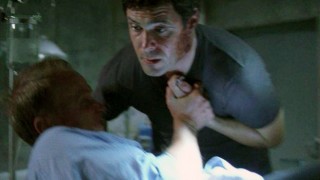It’s been a long wait for 24 fans. A whole season was pre-empted last year due to the writer’s strike, but it’s brought back the show energized and better than ever. And the long break even afforded the creative team to craft a stellar two-hour prequel 24: REDEMPTION which airs Fox on Sunday, November 23 (only to hit DVD two days later).
The two-hour movie (told in real-time), has Jack Bauer (Kiefer Sutherland), living a solitary (and peaceful) life in Africa, only to get caught up in a coup that threatens the lives of local children. All you have to say is “life-threatening” and Jack is strapping on a gun, shooting down the bad guys and taking no prisoners. Just the way fans of the series like it.
Executive producer Howard Gordon (who also wrote the prequel) spoke with iF in this exclusive three-part interview discussing the evolution of REDEMPTION, the long path that lead to Season 7, and the brief dabbling with Jack as a bad guy.
Why did the new TV movie title change from 24: EXILE to 24: REDEMPTION?
Someone at Fox didn’t like it.
Did you prefer one over another?
I think any name is ultimately going to be less elegant. 24 is such a great name. I understand why they had to name it, to distinguish it from the season, but I felt like every name could be from a cheesy action movie.
It was really refreshing to see Jack Bauer back in action after so long. With all the crap that’s been going on in the world, there was something comforting about having Jack take down the bad guys again.
I felt the same way. His heroism is intact.
This has been weird season to get started what with the writer’s strike, stopping, restarting, doing the TV movie – and completely skipping airing a season last year.
It’s been a very interesting what has now been 18 months creatively. There’ve been internal and external factors that have been obstacles for this season. I think any series in its seventh year is going to have its challenges, but I think this is a uniquely challenging series to do.
Can you walk me through this process? The original plan with 24 – Season 7, there was something scripted originally that was set in Africa even before the writer’s strike, but this plan was aborted.
We actually wrote a couple of scripts that had Jack in Africa. We wrote about a script and a half, and after a draft or two of that story, it occurred to all of us that it wasn’t working. We then took another path, and that didn’t work, and what eventually became Season 7, was our third attempt to get it right.
What was the second attempt?
It had Jack as a bad guy. Every attempt was an attempt to answer the question “What did Jack do after he stepped off the cliff in Season 6?” Because it was so oblique and unclear. In years past, we knew what our opening gambit would be, because it was defined by the cliffhanger the year before. This was a far more existential and open-ended thing situation that was open to interpretation. That second iteration had Jack as a guy who we believe has gone dark and ultimately, hasn’t, but that one didn’t work either. Finally, we settled on this one. As it turned now, the person who has gone to the dark side, turns out to be Tony Almeida (Carlos Bernard).
As enticing as it is to make Jack the bad guy, in many ways, you have to have him your hero. And as much as 24 breaks the rules, you have to adhere to that, because he’s already straddling that gray line between good and bad anyway.
That’s exactly right. There’s enough interesting stuff about his character to play transparently, then to do that. Obviously, when Jack turned out to be a good guy, then we’re pulling one over on the audience. That’s always turned out to be a bad thing. We’ve done it a couple of times and it’s always backfired on us. At the beginning of Season 3, Jack was playing a hand with some hidden cards in his pockets he didn’t reveal to us, the audience, what he was up to. It’s always tricky, when in real time, when your lead character, your star, knows things he’s not sharing with the audience. Real time is built on the understanding the point of view and dilemmas that face your characters.
So how many episodes did you complete before the strike?
Eight. Then after the strike, we did four, and then we did the prequel.
So when you came back, did you have to rethink anything you had shot previously?
We didn’t so much have to rethink it, but we got to see it with some time and distance and had to reshoot a couple of things. We also re-evaluated what worked and didn’t work and I think it helped us build a season that is going to be better because of that time and distance. And of course, we got the chance to do the prequel. Ultimately, one of the things we did, I think because we had taken three runs at it, is the story we wound up telling is the same story. There’s this a coup in Africa, that has led to this genocide and led to the U.S. intervention in that genocide, the response to that macro-picture, all that was the same, we just ended up telling the story different from Jack’s point of view. The back story stayed the same, but how we got into it, is what shifted. What I think what happened, as rich as and detailed story that occurred in the all the writer’s collective minds, some things were short-handed and didn’t play as dramatically or as clearly as they might have and I think the prequel remedied that.
Then you came back after the prequel and there was something in the press where you shut down a few weeks back.
That wasn’t until Episode 19. Around Episode 19 and 20, we wrote a couple of scripts and they weren’t up to snuff. The studio could have easily said “go ahead and shoot them.” That was the debate we had. They trusted us creatively. We had the time, we weren’t up against an airdate, so we took the time to reshape it and get it right. It’s tricky doing 24 hours. If you don’t hit it exactly right, it’s not like any other show where you can write it off and say “that was just a mediocre episode,” it has such implications downstream, you have to be a lot ahead or just get really lucky.
Outside of cable on occasion, this is unprecedented for a network TV series to have all 24 episodes of a show finished before even a single episode airs.
Yes, it’s totally unprecedented.
Does that give you leeway to plan the next season early?
There will be a little break, which is terrific and then we have to get back to it as soon as possible.
Will you start shooting the new season earlier?
It’s pretty much unclear – all those things are up in the air.
Did you consider doing 24: REDEMPTION as twenty-four hours compressed into two hours or was it always two hours in real time?
I always suspected we would do the real time thing. The narrative energy of the show really is real time. Some of its novelty has worn off, but I think it still gives the show an energy that only real time can allow. The trick was finding a story that begins and ends in two hours and that’s a trick.
But you do that a lot with the season premieres.
That’s true, but it’s still the beginning of a season. Here we needed to tie it up.
How was it going some place completely different to shoot a show that’s been shooting for so long in Los Angeles. Did it energize everyone?
It was a very energizing experience creatively. I didn’t go, unfortunately, because I was back here writing, but it was great seeing Jack Bauer in such a different place — both emotionally and physically.
REDEMPTION really leads in to the new season well, unlike previous seasons. Would you ever attempt to do it again?
To me, it’s all story specific. If there’s a story to tell, that’s great, but the peculiar challenges of 24, I think are peculiar. I think you can’t say that if it works once, that it will work again. I think you need to find the story and I don’t think it should be done unless it’s supported by that story.
Jack is probably the most damaged person on television. Will he ever find any peace? He goes away, like in REDEMPTION, to get far from his previous life and he always gets sucked into something. It’s the GODFATHER III thing.
That’s a great point. When you are that character, and at some level of course, there is a conceit, Jack reboots every year, but I think the cumulative toll of all the things he’s lost and all the things he’s done, it’s a collective judgement. Obviously last year was a particularly cruel one for Jack in the media. Abu Ghraib, and the conceits into that conduct, have come home to roost on the show. So the show is viewed through a different lens now. So not only has Jack lost so much, but the world is a different place when the show first launched. It makes him a far more complex, darker character than when he first started.
Yes, Jack has gotten lumps last season, with so much that’s happened in the real world, but you do want Jack to go somewhere like a corporation and beat someone up and not care about the repercussions.
I always suspected there was some part of Jack that is a wish-fulfillment that cuts across the political, partisan politics. It’s a guy who gets shit done. I agree, oddly enough, seeing him mostly in the context of the world, a world where things are falling apart so much in some many places, just to see a guy who is so capable of saving the day, he is comfort food. He’s an American hero.
The eight episodes that were filmed before the writer’s strike were informed by the knocks the show was taking about “torture” and putting Jack on trial for his methods. Did the storyline shift since things have changed so much in that time?
I think the world was trending in a direction that it has trended in. The break didn’t affect that much part of it.
How did the Writer’s strike affect the storytelling that was already completed before the strike?
I think creatively being able to catch our breath was a big help. I don’t know how truly the strike changed the direction of the show.
Having Tony Almedia [Carlos Bernard] back is pretty ground-breaking too. Most of the time, TV shows, 24 included, will bring a new villain in that has shades of grey. Yet, here is a case where we spent multiple seasons rooting for Tony. We know who he is and what he is, and now he’s the bad guy – which is going to be very tough for us to watch him get the crap beat out of him by Jack, because you still like the guy. Did you have that dilemma as writers as well?
It has been a tremendous challenge. It’s hard to talk about it too much without giving too much away. Our affection for Tony, has made the year challenging. Tony as a character, who in many ways is a reflection of Jack, is a valuable character to the show.


